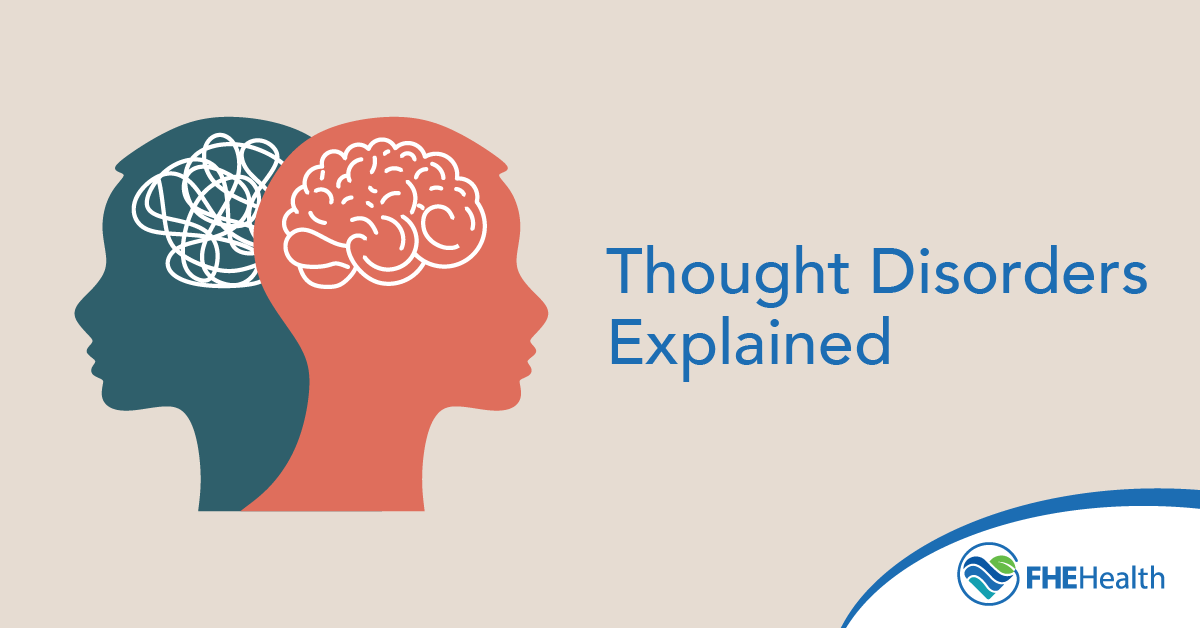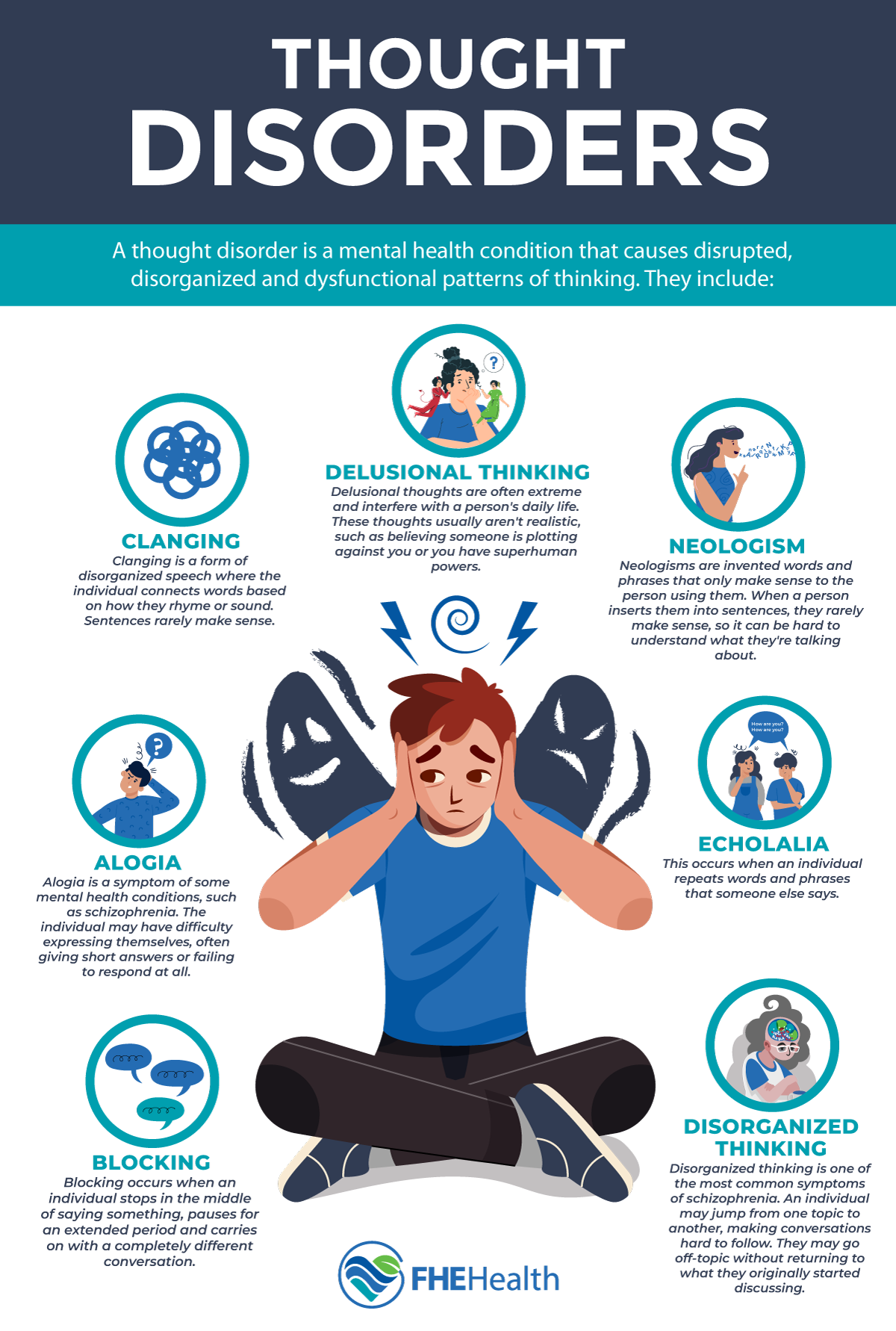
It’s common for your thoughts to wander occasionally, especially during times of stress. But for individuals with certain mental health conditions, an illogical thought process isn’t just a temporary occurrence. Regularly occurring disorganized thoughts can be distressing and even interfere with your daily life. This article defines thought disorders and the common types and explains how to diagnose, treat and live with them.
What Are Thought Disorders?
A thought disorder is a mental health condition that causes disrupted, disorganized and dysfunctional patterns of thinking. An individual with a thought disorder may have a hard time expressing how they feel or connecting their thoughts in a logical order. When you try to communicate with someone who has a thought disorder, you may find them confusing or hard to follow.

Common Types of Illogical Thought Processes
Mental health professionals recognize several types of thought disorders, each with its own set of symptoms. Some of the most common thinking disorders include:
- Blocking. Blocking occurs when an individual stops in the middle of saying something, pauses for an extended period and carries on with a completely different conversation.
- Alogia. Alogia is a symptom of some mental health conditions, such as schizophrenia. The individual may have difficulty expressing themselves, often giving short answers or failing to respond at all.
- Clanging. Clanging is a form of disorganized speech where the individual connects words based on how they rhyme or sound. Sentences rarely make sense.
- Delusional thinking. Delusional thoughts are often extreme and interfere with a person’s daily life. These thoughts usually aren’t realistic, such as believing someone is plotting against you or you have superhuman powers.
- Neologism. Neologisms are invented words and phrases that only make sense to the person using them. When a person inserts them into sentences, they rarely make sense, so it can be hard to understand what they’re talking about.
- Echolalia. This occurs when an individual repeats words and phrases that someone else says.
- Disorganized thinking. Disorganized thinking is one of the most common symptoms of schizophrenia. An individual may jump from one topic to another, making conversations hard to follow. They may go off-topic without returning to what they originally started discussing.
How Thought Disorders Affect Communication and Behavior
There’s a strong relationship between what we say and what we think. We use words to communicate ideas and feelings. So when someone’s thoughts become disorganized, it shows up in the way they talk. The person may have problems staying on topic or answering questions, leading to frustration and misunderstandings. In some cases, an individual with incoherent thought processes will withdraw from others because they’re afraid of saying something that doesn’t make sense. Delusional thoughts might cause someone to act overly defensively or completely avoid people. Thought blocking can interfere with everyday responsibilities like work or school. The way these illogical thought processes affect a person’s life depends on the severity of their symptoms and whether other mental health conditions are present.
Associated Mental Health Conditions
Disorganized thought processes are often associated with certain mental health conditions. Some of the most common include:
- Schizophrenia. Thought disorder is a common feature of schizophrenia. Delusions, hallucinations and disorganized thoughts can make it hard for a person to communicate and function without help. Approximately half of all individuals with schizophrenia have a co-occurring disorder, making it harder to treat thought disorders.
- Bipolar disorder. An individual with bipolar disorder can have psychotic episodes that make them delusional. Conversations can be confusing and difficult to follow.
- Major depressive disorder. Like bipolar disorder, an individual with major depressive disorder may experience psychotic symptoms that cause thought disturbances and problems with speech.
- Schizoaffective disorder. This condition combines the symptoms of schizophrenia with a mood disorder like depression. The combined symptoms can cause a person to think irrationally, making it hard to express themselves.
- Autism. Autistic individuals often experience persistent or repetitive thought patterns. These patterns make language and communication difficult.
Diagnosis and Treatment Approaches
Diagnosing thought disorders can be a lengthy process that requires monitoring and multiple assessments, including:
- Interviews
- Speech and behavior observations
- Thought Disorder Index (TDI)
- Rorschach inkblot test
Once an individual has been properly diagnosed, a doctor or therapist can help customize a treatment plan. This plan typically involves several methods.
- Therapy. Cognitive behavioral therapy, or talk therapy, can help an individual recognize and control their disordered thoughts.
- Medications. Antipsychotic medications are effective at treating thought disorders, especially when they accompany conditions such as schizophrenia. These drugs include flupentixol, benperidol and amisulpride. These medications help balance the levels of serotonin and dopamine in the brain. It may take several tries to find a prescription that helps.
- Speech therapy. Speech therapists can help address challenges that make it difficult to communicate.
- Psychoeducation. One of the first steps to treatment is learning more about the condition. Individuals and their families should read up on the symptoms and learn to recognize and respond appropriately.
Living With or Supporting Someone With a Thought Disorder
Living with and understanding a person who struggles with a thought disorder can be challenging. It can also be rewarding for both the person and their loved ones. There are a few practical tips to help make coping with the condition easier.
- Remain patient. Communication can be hard for a person struggling with disorganized thoughts. Be patient and try to listen without judgment or interruption.
- Seek professional help. Help your loved one find professional help. Research facilities that provide treatment options and attend family or group meetings for support.
- Set boundaries. Learn to take a break from conversations when topics become distressing or communication becomes too frustrating.
- Avoid arguing. Instead of criticizing or trying to prove them wrong when the person is being delusional, focus on providing support.
- Education. Learn more about the condition and seek ways you can help.
- Focus on self-care. Living with someone who has a thought disorder can be challenging. Take time to focus on yourself. Seek out support groups and therapy, engage in hobbies and connect with friends and other family members who understand.
Getting Help for Illogical Thought Processes
If you or someone you love struggles with a thought disorder, help is available. Contact FHE Health to speak to one of our counselors about available mental health treatment options.






